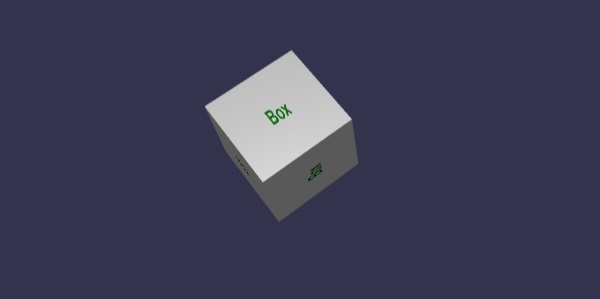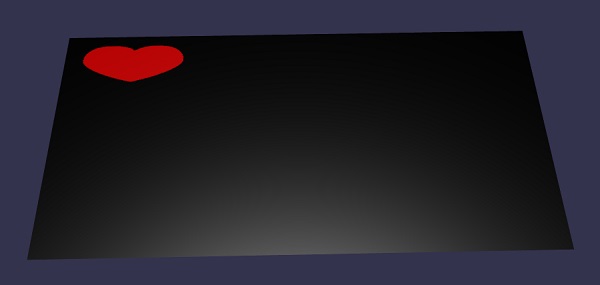BabylonJS - 动态纹理
BabylonJS 的动态纹理会创建一个画布,您可以轻松地在纹理上书写文本。它还允许您使用画布并使用 html5 画布提供的所有功能与动态纹理一起使用。
我们将使用一个示例,该示例将展示如何在纹理上书写文本,还将在我们创建的网格上绘制贝塞尔曲线。
语法
以下是创建动态纹理的语法 −
var myDynamicTexture = new BABYLON.DynamicTexture(name, option, scene);
参数
以下是创建动态纹理 − 所需的参数
name −动态纹理的名称
option − 将具有动态纹理的宽度和高度
scene − 创建的场景
语法
以下是在纹理上写入文本的语法 −
myDynamicTexture.drawText(text, x, y, font, color, canvas color, invertY, update);
参数
以下是在纹理上写入文本所需的参数 −
text − 要写入的文本;
x −距左侧边缘的距离;
Y − 距顶部或底部边缘的距离,取决于 invertY;
font − 字体定义,格式为 font-style、font-size、font_name;
invertY − 默认为 true,此时 y 是距顶部的距离,为 false 时,y 是距底部的距离,字母反转;
update − 默认为 true,动态纹理将立即更新。
演示
<!doctype html>
<html>
<head>
<meta charset = "utf-8">
<title>MDN Games: Babylon.js demo - shapes</title>
<script src = "https://end3r.github.io/MDN-Games-3D/Babylon.js/js/babylon.js"></script>
<style>
html,body,canvas { margin: 0; padding: 0; width: 100%; height: 100%; font-size: 0; }
</style>
</head>
<body>
<canvas id = "renderCanvas"></canvas>
<script type = "text/javascript">
var canvas = document.getElementById("renderCanvas");
var engine = new BABYLON.Engine(canvas, true);
var createScene = function() {
var scene = new BABYLON.Scene(engine);
var camera = new BABYLON.ArcRotateCamera("Camera", -Math.PI/2, Math.PI / 3, 25, BABYLON.Vector3.Zero(), scene);
camera.attachControl(canvas, true);
var light = new BABYLON.HemisphericLight("light1", new BABYLON.Vector3(0, 1, 0), scene);
light.intensity = 0.7;
var box = BABYLON.Mesh.CreateBox("box", 3.0, scene);
box.position = new BABYLON.Vector3(0, 0, -5);
//创建动态纹理
var textureGround = new BABYLON.DynamicTexture("dynamic texture", {width:512, height:256}, scene);
var textureContext = textureGround.getContext();
var materialGround = new BABYLON.StandardMaterial("Mat", scene);
materialGround.diffuseTexture = textureGround;
box.material = materialGround;
//将文本添加到动态纹理中
var font = "bold 60px Arial";
textureGround.drawText("Box", 200, 150, font, "green", "white", true, true);
return scene;
};
var scene = createScene();
engine.runRenderLoop(function() {
scene.render();
});
</script>
</body>
</html>
输出

动态纹理还允许使用 html5 画布方法和动态纹理上的属性,如下所示 −
语法
var ctx = myDynamicTexture.getContext();
演示
<!doctype html>
<html>
<head>
<meta charset = "utf-8">
<title> Babylon.JS : Demo2</title>
<script src = "babylon.js"></script>
<style>
canvas { width: 100%; height: 100%;}
</style>
</head>
<body>
<canvas id = "renderCanvas"></canvas>
<script type = "text/javascript">
var canvas = document.getElementById("renderCanvas");
var engine = new BABYLON.Engine(canvas, true);
var createScene = function () {
var scene = new BABYLON.Scene(engine);
var camera = new BABYLON.ArcRotateCamera("Camera", -Math.PI/2, Math.PI / 3, 25, BABYLON.Vector3.Zero(), scene);
camera.attachControl(canvas, true);
var light = new BABYLON.HemisphericLight("light1", new BABYLON.Vector3(0, 1, 0), scene);
light.intensity = 0.7;
var ground = BABYLON.MeshBuilder.CreateGround("ground1", {width: 20, height: 10, subdivisions: 25}, scene);
//创建动态纹理
var textureGround = new BABYLON.DynamicTexture("dynamic texture", 512, scene);
var textureContext = textureGround.getContext();
var materialGround = new BABYLON.StandardMaterial("Mat", scene);
materialGround.diffuseTexture = textureGround;
ground.material = materialGround;
//Draw on canvas
textureContext.beginPath();
textureContext.moveTo(75,40);
textureContext.bezierCurveTo(75,37,70,25,50,25);
textureContext.bezierCurveTo(20,25,20,62.5,20,62.5);
textureContext.bezierCurveTo(20,80,40,102,75,120);
textureContext.bezierCurveTo(110,102,130,80,130,62.5);
textureContext.bezierCurveTo(130,62.5,130,25,100,25);
textureContext.bezierCurveTo(85,25,75,37,75,40);
textureContext.fillStyle = "red";
textureContext.fill();
textureGround.update();
return scene;
};
var scene = createScene();
engine.runRenderLoop(function() {
scene.render();
});
</script>
</body>
</html>
输出

说明
我们已经创建了地面网格并为其添加了动态纹理。
//地面网格
var ground = BABYLON.MeshBuilder.CreateGround("ground1", {width: 20, height: 10, subdivisions: 25}, scene);
//创建动态纹理
var TextureGround = new BABYLON.DynamicTexture("dynamic Texture", 512, scene);
//使用标准材质向地面添加动态纹理
var MaterialGround = new BABYLON.StandardMaterial("Mat", scene);
materialGround.diffuseTexture = TextureGround;
ground.material = MaterialGround;
要使用动态纹理上的画布,我们需要先调用画布方法 −
var TextureContext = TextureGround.getContext()
我们将在画布上添加贝塞尔曲线,如下所示 −
textureContext.beginPath(); textureContext.moveTo(75,40); textureContext.bezierCurveTo(75,37,70,25,50,25); textureContext.bezierCurveTo(20,25,20,62.5,20,62.5); textureContext.bezierCurveTo(20,80,40,102,75,120); textureContext.bezierCurveTo(110,102,130,80,130,62.5); textureContext.bezierCurveTo(130,62.5,130,25,100,25); textureContext.bezierCurveTo(85,25,75,37,75,40); textureContext.fillStyle = "red"; textureContext.fill(); textureGround.update();


